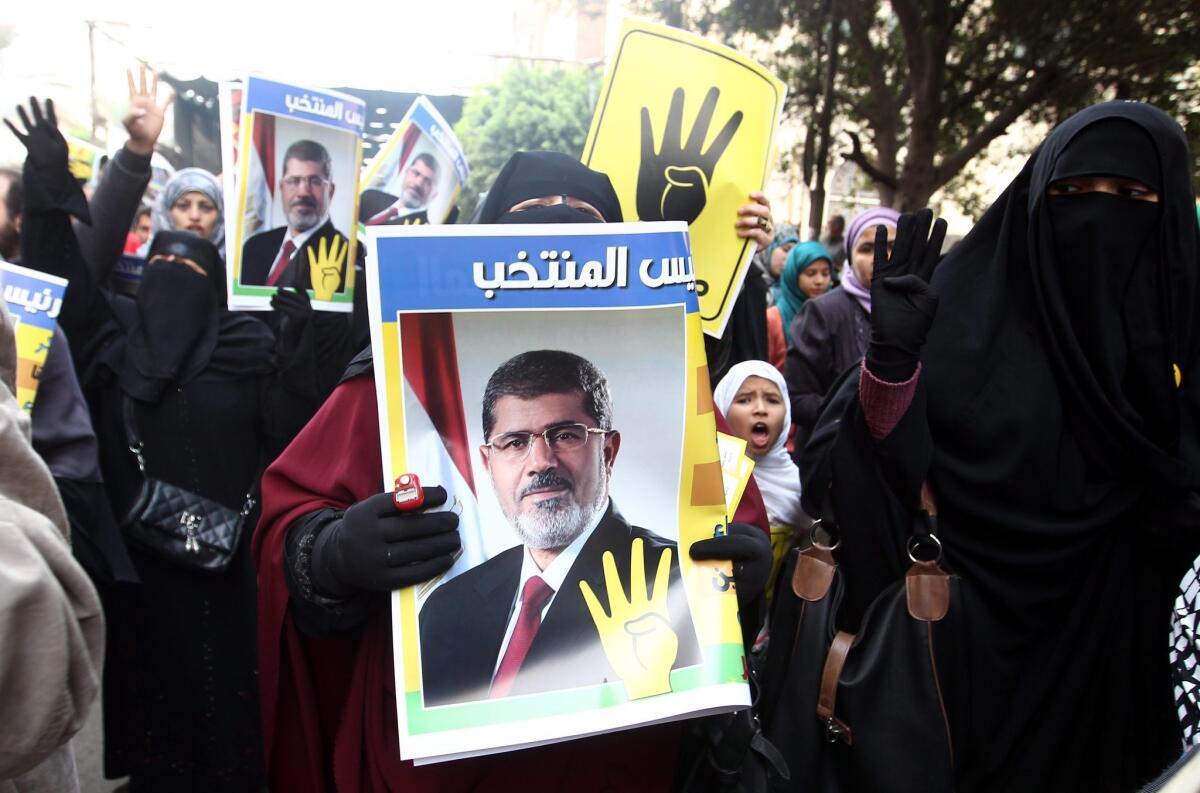Egyptian court sets Morsi foreign-conspiracy trial for Feb. 16

- Share via
CAIRO -- An Egyptian court on Tuesday set a Feb. 16 date for deposed president Mohamed Morsi to go on trial on charges of colluding with foreign militant groups such as Hamas and Hezbollah.
Morsi is facing a total of four separate trials on what his Muslim Brotherhood organization claims are trumped-up charges, several of which could carry the death penalty. This week, he was ordered to stand trial for insulting the judiciary.
The charges against Morsi, Egypt’s first democratically elected president, range from the extremely serious to the trivial; one charge sheet includes accusations of poultry thievery. Human rights groups have expressed repeated concerns about politically motivated prosecutions by the military-backed interim government, which has worked assiduously to stifle political dissent.
Morsi is due back in court next week on the first of the charges lodged against him, incitement to kill demonstrators outside the presidential palace. A scheduled appearance earlier this month was called off after authorities said the weather did not permit a helicopter flight from his high-security prison to the court venue.
That appearance would have come less than a week before Egypt’s constitutional referendum -- a vote that the Brotherhood urged Morsi’s supporters to boycott -- and authorities may have wanted to deny the former leader a forum for a fresh show of defiance.
The trial’s initial session, in November, dissolved into pandemonium when the ex-president and his co-defendants shouted that they did not recognize the authority of the court or the interim government.
The new constitution won overwhelming approval -- more than 98% -- but turnout was lukewarm, with young people staying away in particularly large numbers. That pointed to a deeply polarized public, with fervent support in some quarters for army chief Gen. Abdel Fattah Sisi, the country’s most powerful figure, but apathy or hostility on the part of many others.
During Morsi’s yearlong tenure, which ended when the military removed him from office in July following huge demonstrations against his rule, Islamist militant groups strengthened their foothold in the Sinai Peninsula. Egypt has accused Hamas, which runs the neighboring Gaza Strip, of aiding the Sinai militants in their attacks on Egyptian security forces. Hamas has consistently denied any involvement.
Thirty-five co-defendants, many of them already in jail, are to go on trial alongside Morsi on the foreign-conspiracy charges. Most of the Brotherhood’s senior leaders are imprisoned, in exile or in hiding, and the movement has been formally designated a terrorist organization by the interim government.
ALSO:
Mexican vigilante groups refuse to lay down arms in Michoacan
Sochi Olympics safety fears soar after video, ‘white widow’ report
‘Hello, world’: Rosetta spacecraft wakes for comet-chasing mission
Special correspondent Amro Hassan contributed to this report.
More to Read
Sign up for Essential California
The most important California stories and recommendations in your inbox every morning.
You may occasionally receive promotional content from the Los Angeles Times.













